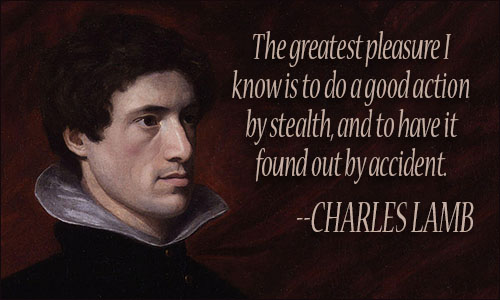CHARLES LAMB QUOTES
English essayist and critic (1775-1834)

Who first invented work and bound the free
And holiday-rejoicing spirit down
To the unremitting importunity
Of business, in the green fields, and the town;
To plough, loom, anvil, spade--and oh! most sad!
To this dry drudgery of the desk's dead wood?
Who but the Being unblest, alien from good,
SABBATHLESS SATAN!
CHARLES LAMB
"Sonnet", The Examiner, Jun. 20, 1819
What a place to be is an old library! It seems as though all the souls of all the writers, that have bequeathed their labours ... were reposing here, as in some dormitory, or middle state. I do not want to handle, to profane the leaves, their winding-sheets.
CHARLES LAMB
Elia and the Last Essays of Elia
We are ashamed at the sight of a monkey--somehow as we are shy of poor relations.
CHARLES LAMB
"Table-Talk and Fragments of Criticism", The Life and Works of Charles Lamb
Trample not on the ruins of a man.
CHARLES LAMB
"Confessions of a Drunkard", The Last Essays of Elia
Think what you would have been now, if instead of being fed with tales and old wives' fables in childhood, you had been crammed with geography and natural history!
CHARLES LAMB
letter to Samuel Taylor Coleridge, Oct. 23, 1802
There is a pleasure in affecting affectation.
CHARLES LAMB
"Table Talk", Works: Essays and Sketches
The vices of some men are magnificent.
CHARLES LAMB
"Table-Talk and Fragments of Criticism", The Life and Works of Charles Lamb
The man must have a rare recipe for melancholy, who can be dull in Fleet Street.
CHARLES LAMB
letter to Thomas Manning, Feb. 15, 1802
The human species, according to the best theory I can form of it, is composed of two distinct races, the men who borrow, and the men who lend.
CHARLES LAMB
"The Two Races of Men", Essays of Elia
The greatest pleasure I know is to do a good action by stealth, and to have it found out by accident.
CHARLES LAMB
"Table-Talk and Fragments of Criticism", The Life and Works of Charles Lamb
Riddle of destiny, who can show
What thy short visit meant, or know
What thy errand here below?
CHARLES LAMB
"On an Infant Dying as Soon as Born"
Rags, which are the reproach of poverty, are the beggar's robes, and graceful insignia of his profession, his tenure, his full dress, the suit of which he is expected to show himself in public.
CHARLES LAMB
Essays of Elia
No woman dresses below herself from mere caprice.
CHARLES LAMB
attributed, Day's Collacon
Newspapers always excite curiosity. No one ever lays one down without a feeling of disappointment.
CHARLES LAMB
"On Books and Reading", The Last Essays of Elia
Milton almost requires a solemn service of music to be played before you enter upon him. But he brings his music, to which, who listens, had need bring docile thoughts and purged ears.
CHARLES LAMB
"On Books and Reading", The Last Essays of Elia
I conceive disgust at those impertinent and misbecoming familiarities, inscribed upon your ordinary tombstones. Every dead man must take upon himself to be lecturing me with his odious truism, that "such as he now is, I must shortly be." Not so shortly, friend, perhaps, as thou imaginest. In the meantime I am alive. I move about. I am worth twenty of thee. Know thy betters!
CHARLES LAMB
"New Year's Eve", Essays of Elia
I can scarce bring myself to believe, that I am admitted to a familiar correspondence, and all the license of friendship, with a man who writes blank verse like Milton.
CHARLES LAMB
letter to Samuel Taylor Coleridge, Feb. 13, 1797
He might have proved a useful adjunct, if not an ornament to society.
CHARLES LAMB
Captain Starkey
He is no lawyer who cannot take two sides.
CHARLES LAMB
letter to Mr. Rogers, Dec. 1833
For I hate, yet love thee, so,
That, whichever thing I show,
The plain truth will seem to be
A constrained hyperbole,
And the passion to proceed
More from a mistress than a weed.
CHARLES LAMB
"A Farewell to Tobacco"